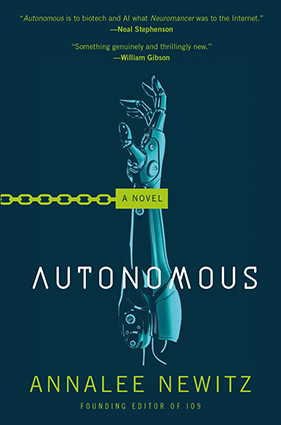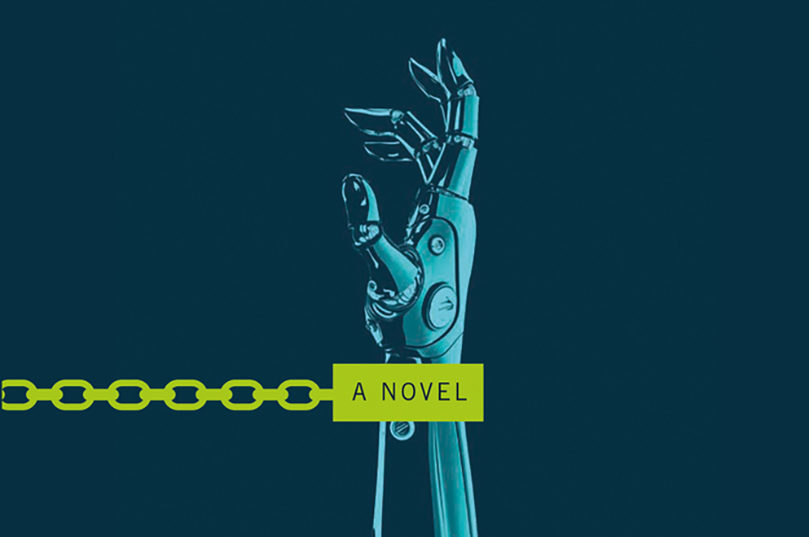opens in a new window Written by Annalee Newitz
Written by Annalee Newitz
There are some truths you can only tell in fiction
I’ve been a professional writer for most of my adult life, but it’s only recently that I wanted to write fiction. As a reader, I’ve been a voracious consumer of science fiction since I was a kid. But when it came to writing, I preferred to focus on the awe-inspiring real world of scientific discovery. As a science journalist, I’ve reported on stories from medieval reservoirs in Cambodia to underground cities in Turkey, and from laser-packed labs at MIT to a massive genome sequencing facility in California.
But I never reported on the stories I’ve always told myself privately, in my own head. Until now: my first novel, Autonomous, comes out on September 19.
I decided to start writing fiction because it seemed like the only way to tell the truth—at least, about some things. When I’m writing as a journalist, I have an ethical obligation to put facts before opinions and analysis. I also have to consider how my stories will affect the lives of real people. What I write could get someone fired, or ruin their reputation. On the flip side, highlighting a researcher’s work could give them an unfair advantage if colleagues perceive them as someone with media access. I have none of these concerns as a fiction writer. I can say whatever I want about my characters, and nobody gets hurt.
Nevertheless, I approached writing Autonomous the way I would a nonfiction work. I talked to neuroscientists and synthetic biologists about the novel’s biotech. I forced some roboticists to have dinner with me and speculate about what my robot protagonist Paladin’s body would be made of. I traveled to Casablanca, where my pirate protagonist Jack has a home base, to witness the culture and infrastructure of the city firsthand. I had a lot of conversations with a computer security expert about how machines exchange data with each other using encryption.
The science and technology in this novel are as plausible as I could make them. With help from a lot of experts, I extrapolated 150 years into the future, based on what we know now.
But the story itself, of a scientist driven to crime by her conscience, is something I could never tell in my nonfiction. Jack is inspired by people I have known, but she’s entirely her own (fictional) person. So is Paladin the human-equivalent AI, a robot who has been programmed with a happy obedience that becomes a form of mental bondage.
I extrapolated their social world from our own, much the way I extrapolated the science and technology. Jack and Paladin live in future global cultures founded on the very same property rights that most of us have today almost everywhere in the world. But these rights have become so extreme that they extend to owning sentient beings. There is a worldwide system of indenture that’s administered by the twenty-second century’s version of a human rights commission. I thought it was pretty realistic that slavery would be described as a “right”—the right to own, the right to be owned.
The truth is that advances in science and technology don’t always set us free. They can be used to keep us compliant, even when we are unhappy; they can be used to enslave us. But that’s not the full truth either. Even within the rigid system of indenture that I’ve devised, people find ways to rebel. Humans and robots manage to assert control over their destinies. The system of indenture is messy, broken, and vulnerable, just like every authoritarian regime in history.
Science is just a methodology. Technology is just a set of tools. They are magnificent, and they can give us a more accurate understanding of the universe. But they can also delude us in ways that are profound. What people do with science matters as much as the science itself. Maybe more.
I wrote a book of lies to tell you one truth. We are at a crossroads as a civilization, and science isn’t going to save us. But people will.
Order Your Copy
opens in a new window opens in a new window
opens in a new window opens in a new window
opens in a new window opens in a new window
opens in a new window opens in a new window
opens in a new window opens in a new window
opens in a new window
Follow Annalee Newitz on Twitter and on her website.







I love the amount of research that went into this. I find I appreciate work so much more when I see how the author has spent time trying to make it as authentic as possible.
Annalee, even though we may be about as far apart as two people can be on the sane side of the political spectrum, I have always admired your writing. You bring a level of fairness and restraint to the perspectives you share in your stories that is (sadly) unparalleled in most of your journalistic peers. And your stuff is just downright fun. I imagine we’d probably be best buds IRL, but I guess I’ll be okay settling for continuing to read and enjoy your work. Looking forward to “Autonomous” like I haven’t done for an upcoming novel in a long time. Thank you.